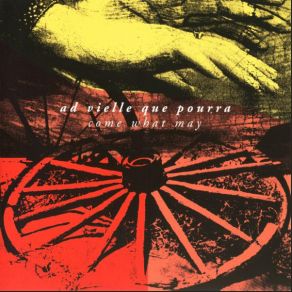Come What May
Download links and information about Come What May by Ad Vielle Que Pourra. This album was released in 1989 and it belongs to New Age, World Music, Pop, Celtic genres. It contains 14 tracks with total duration of 51:40 minutes.

|
|
|---|---|
| Artist: | Ad Vielle Que Pourra |
| Release date: | 1989 |
| Genre: | New Age, World Music, Pop, Celtic |
| Tracks: | 14 |
| Duration: | 51:40 |
| Buy it NOW at: | |
| Buy on iTunes $9.99 | |
Tracks
[Edit]| No. | Title | Length |
|---|---|---|
| 1. | Un Cosaque à Paris | 1:55 |
| 2. | Adagio des années mornes | 6:40 |
| 3. | Evit Gabriel | 3:29 |
| 4. | Kanaouen an dud a vor | 4:27 |
| 5. | Micro-polka | 1:04 |
| 6. | Valse minette /Les patates ont germé à St. Amable | 4:29 |
| 7. | Tu nous les kas-ebarh toi | 2:46 |
| 8. | Chanson à la mariée | 4:36 |
| 9. | Laride D. T. / Polka d'été | 5:02 |
| 10. | Plinn an Enaouer | 5:16 |
| 11. | À St. Malo-sur-Mer | 2:31 |
| 12. | Le drao du mao | 3:02 |
| 13. | Le conscrit de Napoléon | 4:13 |
| 14. | Bourrée en ré | 2:10 |
Details
[Edit]Come What May represents the acme of this Montreal-based quintet's attempts to create a new, more sophisticated folk music out of Breton roots. (The Bretons are the Celts of northern France.) Although the same whirring, wheezing combination of hurdy-gurdy, accordion, bombarde, and so forth is found on this album as on the group's earlier efforts, everything comes together more smoothly. The instruments are recorded better, so it is possible to write more complex songs for them. Some tracks achieve an almost Bach-like interplay of lines. Roughly half of the tracks are songs, and the rest are instrumentals. This makes for a nice mix. None of the musicians has a great voice, but they bring a peasant-like sincerity and sentimentality to the proceedings. On a track like "Kanouen An Dud A Vor," for instance, this is especially true. On this sailor's lament with traditional lyrics the whole group joins in on the choruses, sounding like a bunch of old friends singing over a glass of wine in a village cafe. And any of the first three tracks would serve as an example of instrumental virtuosity, with the best perhaps being "Evit Gabriel." Beginning with a traditional-sounding motif played on recorder and gradually picking up speed and instruments, it eventually becomes a headlong whirl of dance-rhythms, all dedicated to the composer's son. The tunes are playful, witty, and experimental without being jarring. They mix subtle elements of jazz and film scores as well as Flemish and Parisian music. If you like Django Reinhardt, Solas, or Cafe Noir, give these folks a try.